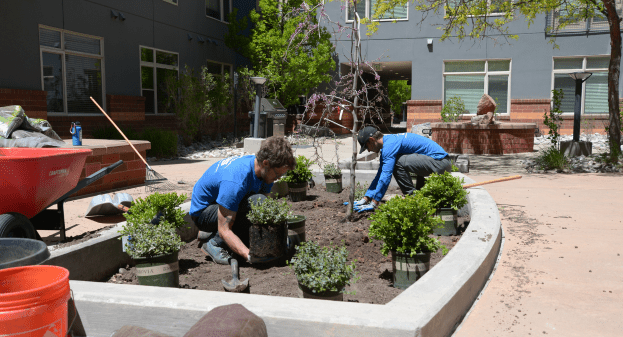Spring is a time of transitioning weather and, as such, a time when your commercial property’s plants and trees will also begin to change. After a long, cold Colorado winter, there are certain steps necessary to maintain tree health care and prepare for this shift. The most crucial plant health care tips are discussed below.
Clean Up Leftover Debris
Leftover debris can create a number of risks to trees and plants after the winter months. Debris such as fallen tree limbs, large twigs, and leaves should be cleared away before warmer months arrive. They can provide fuel for potential wildfires that could have a devastating impact on the surrounding area.
Old fruits left behind may attract insects or carry pathogens which can seriously harm trees and plants in the vicinity. Taking preventative measures like cleaning up any leftover debris is an important first step in protecting trees and plants from further damage.
Check For Winter Damage
Winter weather can take a serious toll on trees and plants, leaving them vulnerable to damage. Cold temperatures can cause weakened root systems, loss of foliage, soil erosion and an increase in susceptibility to disease. Snow and frost can also damage branches and bark, making them more susceptible to rot or insect infestations. This damage could include splitting or cracking of bark or broken branches.
Check For Signs of Infestations
Although you may think of pests as a warmer weather problem, they can also cause significant damage during the winter. For example, rodents may have burrowed into your trees or dug up the roots of your plants when looking for a place to hibernate or shelter during the cold. In addition, certain bugs (especially beetles) may have been taking refuge inside your trees, causing slow but steady damage.
If you see signs of infestation, it is ideal to contact a plant and tree health care professional to inspect and determine the best course to mitigate further damage.
Check Your Commercial Irrigation System
Having a professional company check your irrigation system after the winter can be an important step in preventing additional costs. Winter temperatures can cause pipes to freeze and break, which does not allow the full amount of water to reach the intended trees and plants. This could cause your plants to die, wasting water, and then cost more in water bills.
By having a qualified technician inspect your system, you can have confidence knowing that any problems are addressed before they become a bigger issue. You can also ensure your property’s plants remain healthy throughout the spring.
Check on Mulch Levels
The last step of plant and tree health care during spring preparations is check the mulch levels. Mulch protects plant and tree root systems and helps retain moisture in the soil. Wait until after the last freeze to review if there is enough mulch covering the soil.
If mulch levels look concerning, notify your landscape professionals, they will know the appropriate amount of mulch that should be applied. Too much mulch can cause problems for trees especially if resting on the root ball or again the trunk.
Consider Hiring Professional Commercial Property Services
Plants and trees need continuous attention, throughout every season. Keeping your plants and trees healthy throughout the year can be tedious and take time. Your company may not have the time to spare, but an unkept exterior could leave a bad impression on potential customers. Instead, consider hiring a professional commercial property services company to take care of your plant and tree health care all year.
Need Commercial Plant and Tree Health Care Around Denver?
Proper plant and tree health care take considerable time. If you need professional assistance, call us at (720) 575-3277 or send us a message using our online contact form. One of our friendly team members will be in touch as soon as possible so we can discuss how we can help you with your commercial property needs.

